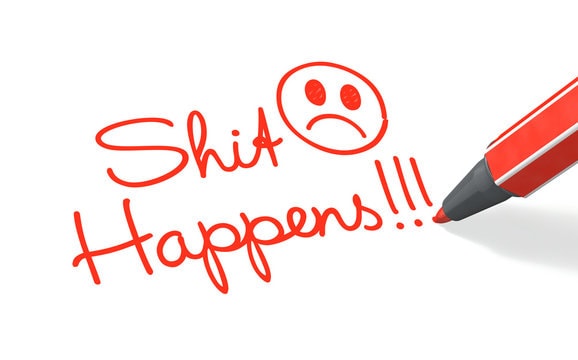Shit Happens…

I was talking with a colleague of mine a few weeks ago, Wes Chyrchel. He asked me about my projects last year and how I felt about them. I felt like most of them were a struggle, they were hard and some of them ended badly. Wes pressed and asked why and what percentage of them were like that. Honestly it felt like all of them were like that.
I watched ‘Boyhood’ the other day. That is a good movie. The father, portrayed by Ethan Hawke, asks his daughter about all the good times they had and she couldn’t seem to remember them instead remembering the bad times. I had that same talk with my mom, as a child. I only remembered the bad times. I didn’t remember the fishing trips, fun in the park, road-tripping or anything… What a little jerk of a kid I was… When I sit and think hard enough I DO remember those good times. My mom is great!
I stepped away and really thought about the good projects and there were a lot of them, some of them were projects I was barely involved in and others I was deeply entrenched in.
Shit Happens…
Perspective and the understanding that I’m a little shitty at predicting the time it takes to finish a project. Whether I bid hourly in a range, or by the project, it didn’t matter. I was over budget and over time. It wasn’t good and it wasn’t making us look good. But even worse, we were making our clients look bad.
At one point, it had gotten bad enough to where our client’s client (they were subbing the dev to us) were worried about losing their account. We were on the verge of being fired. We had been fired one other time before and I didn’t want a repeat of that. I was at a loss for what to do and how to respond to a frantic and desperate email. I phoned a friend, Steve Zehngut of Zeek Interactive. He was calm and he said, “Don’t react, own the problem, tell them what you can do and what you can’t and that while you’re not perfect you’re their partner in this and you’re committed.” It sounded like Zen B.S. at that time, but I knew he was right. Even though he sounded calm and knew just what to say, it’s only because he’s been there, too.
I had a call with my client, I listened to them. They were in a tough place. It’s not that they were angry, certainly they were upset and they wanted any solution we could muster to get things right.
Generally, I feel that assigning blame is futile. It doesn’t matter if your client didn’t do the work, it doesn’t matter if I didn’t do the work; it didn’t get done and there could be great, or horrible, reasons why… Reasons change nothing. Work still needs to get done. However, dealing with projects means you don’t get to have a heart that is three sizes too small, not if you want to keep working regularly. Client management is empathy. Sometimes you have to own it.
I said: “Look, I hear your frustration and I know things are difficult right now. I take full responsibility for where things are at and I’m your partner here. Together we’re going deliver and get this right and here’s how…” The phone call, while stressful, allowed me to have a huge sigh of relief. I was assured by the client that they believed in me still, I assured them that I would not rest until things were done. And we went forward, stayed in communication and eventually delivered.
What I learned… The hard way.
A lot of this could have been avoided in a couple of ways. One is having a process in place that both myself and the client will follow. We use Asana for task management, they used something else. So we were both working on separate tasks with neither of us being the wiser… Mistake. A biggie. This is when a proper onboarding process comes into play. And while mine still needs a lot of work I make sure that all clients are onboard with our Task management and Support system. Rarely any discussions happen outside of our task and support tools, Asana and HelpScout respectively. Things need to be easily documented. Issues like complimentary support are easily concluded when you can point to discussions that help clear up misunderstandings.
Being on the same page is key as is communication.
“When you change the way you see things, the things you see begin to change…”
Even as I closed the year out, I had a few challenging projects and all of them shipped, so that was good. And even though I was stressing a bit, I felt more calm about these projects. Did I care less? No. I cared every bit as much at the end of the year as I did at the beginning.
So what changed?
I knew that I wasn’t estimating properly and I probably never will. Although, I’ve gotten some great advice over the last year. I took two tidbits to heart. One, break all tasks down into their simplest forms and estimate out each item for time/cost. That doesn’t mean you share that with your client, but you’ll know the nitty gritty of the work involved. The other part is, if you’re bad at estimating, make your estimate and then double it… My friend Nathan, at Tyler Digital, jokingly suggests this. It doesn’t mean that you’ll necessarily hit the mark every time; but you have a buffer that you can work within. And if you set the appropriate expectation up front, then everyone is happier.
With my year-end projects, I was sure to communicate and I was sure to settle on how we would work. Two clients we did Asana and one we did a Google Spreadsheet (which worked out super well, I was surprised).
“The Nature of things”
The nature of this business, I find, is that we’re always producing something we’ve not quite done before. Sure, you may have built hundreds of sites before, but not likely the same way. There are considerations and choices that make each and every project a little more different from all the others. That’s what I like about my work; what I love about it. There are going to be bugs, there are going to be delays with anything custom-built… That’s just the way it works, people. I listened to an interview of Curtis McHale on Matt Report not long ago. He said the same thing and went on to say that if you don’t want to spend a lot of time, and not deal with bugs then stop paying for custom work and get something off the shelf and just deal with all the things the out-of-the-box solution doesn’t do. Truer words, people…
What we do is a craft; how we manage our relationships is an art and how we evolve is in the desire, rather, a love for learning…
Get Notified When We Publish New Content!
Join more than 2,500 people who get our marketing automation, business marketing, and WordPress news!
![[Series] Growing Your Business: Marketing Automation FTW](https://digisavvy.com/wp-content/uploads/2016/05/Screen-Shot-2016-05-14-at-4.59.33-PM-768x378.png)





Great post, Alex! We’ve been in the same boat ourselves many a time. I’m glad you mentioned Steve. After getting back from Pressnomics where we heard him give a terrific presentation about building a business, I’ve said it already a dozen times…. “I’m trying to channel my inner Steve Zehngut.”
Own that shit!
Seriously! I didn’t see Alex at PN, but I swear he must have been there for Steve Zehngut’s talk… or perhaps like the rest of us that have known Steve a while, he too has absorbed much of Steve’s sage advice on client management. Reminds me a little of your (John Hawkin’s) Mea Culpa post: http://vegasgeek.com/mea-culpa-now/
Although I didn’t link to you guys the advice you have me at Zeek helped me a lot, man. Breaking work down into its most menial components helps understand the effort that will eventually be put forth. So, many thanks!